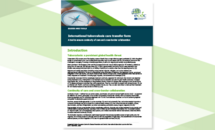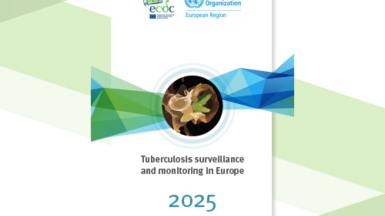International tuberculosis care transfer form
Tuberculosis (TB) remains one of the leading causes of death from a single infectious agent worldwide. While the global burden is concentrated in low- and middle-income countries, high-income nations with low TB incidence continue to face challenges in managing TB among vulnerable populations, in particular migrants and socially marginalised groups.
Most countries in the European Union and the European Economic Area (EU/EEA) report low TB incidence, defined as fewer than 10 cases per 100 000 population. In 2023, approximately one-third of all TB cases reported in the EU/EEA were among individuals born in, or holding citizenship of, a country other than the reporting country.
Migrants and mobile populations (including undocumented migrants, refugees, and asylum seekers) are disproportionally affected by TB due to vulnerabilities during all phases of migration: pre-departure, transit, arrival and integration in the host country, and return travel to their country of origin. These populations often face barriers to timely diagnosis and treatment, including legal, linguistic, and administrative challenges.
Cross-border movement further complicates treatment continuity, especially for individuals who travel or are deported during treatment. Interruptions in TB treatment due to relocation can result in poor health outcomes, increased transmission risk, and the emergence of drug-resistant strains. Migrants in Europe often experience more severe forms of TB disease and poorer outcomes than native populations. They are more likely to present with extrapulmonary TB, be co-infected with TB/HIV, and have multidrug-resistant TB. They are also more likely to interrupt their treatment for non-medical reasons or become lost to follow-up.
Scope and purpose
The transfer form is designed to support continuity of TB care for individuals with TB who move from one country to another. It is a voluntary, generic tool that summarises essential information on the TB management process, including diagnosis and treatment, enabling health providers and public health authorities in the receiving country to have the necessary data to ensure timely support and appropriate care.
Although it has been developed from an EU/EEA perspective, the transfer form is not geographically restricted and may be used in other contexts. It serves as a communication tool between healthcare providers and public health authorities in different settings.
The transfer form is intended to provide a minimum information package on a person with TB who has not completed treatment at the time of relocation. It does not include information on previous or on ongoing contact investigations.
Download








